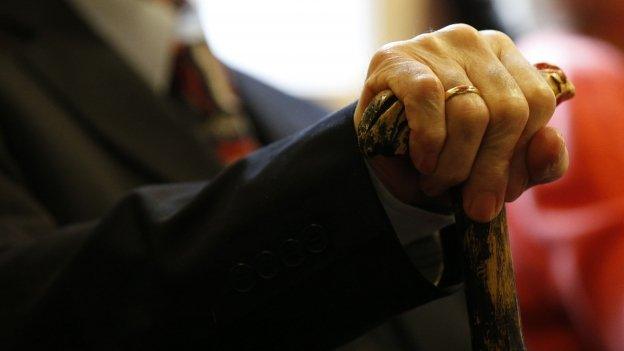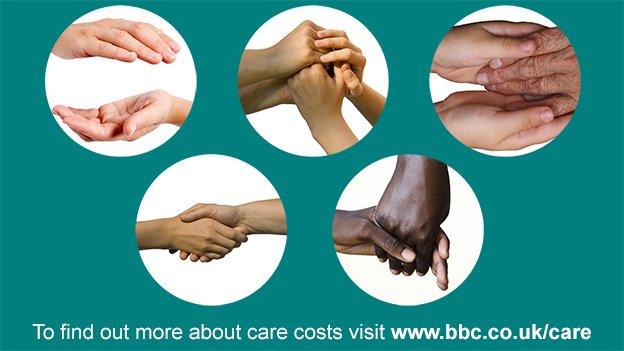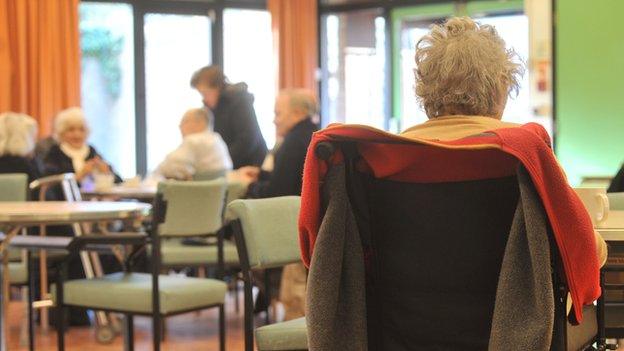Why the rising cost of social care cannot be ignored
- Published

"I've never felt so alone." Those were the words a man in his 80s used to tell me how he felt, after his wife of more than 50 years was diagnosed with dementia.
His words have stuck in my mind because his experience seems to sum up the stories that too many people tell when they need social care.
A consultant had delivered the life-changing news to this man and his wife, then said, "I'll see you in six months." They were handed a leaflet and they left, his wife unable to comprehend what they'd been told so the weight rested on his shoulders.
The diagnosis was delivered by the NHS, but with a condition like dementia you largely step into another world, the world of social care.
Social care is provided by local authorities and only to those with very high needs and limited savings. Everyone else pays for themselves.
We're talking about the support someone may need with everyday tasks such as washing, dressing and getting in and out of bed. If a person has dementia it is often about keeping them safe.
When I met this man, he had been his wife's main carer for several years, helped by their daughters. He paid for extra support, but only wanted to leave her with the right person, someone he could trust.
Social care uncertainty
The cost of the extra help was draining their savings, making him worry about how he will cope in the longer term. It is pressure that made him fear for his own health.
However, if we get social care right then it should keep people out of hospital and there's the rub.
We've seen the recent pressures on accident and emergency and what happens to the health service, when there isn't enough care in place in the community to either prevent problems or to help people recover at home.
Social care certainly isn't the only reason why hospitals started the year struggling, but it is a significant factor.

BBC cost of care project


Local authorities have long complained that social care is chronically underfunded. In response the government says it has provided an extra £1.1bn in funding in the last year alone and that it is for councils to set their spending priorities.
There is one factor that can't be argued over and that is the pressure that comes with an ageing population.
It means that whatever strain the social care system is under now (and there are many campaigners and commentators who say it is already at breaking point) the pressures will increase.
Richard Humphries, who is an expert in social care policy at the King's Fund, external think tank, believes the current outlook is far bleaker than most people realise.
"I think they can expect very little unless they are very poor or have very high needs, in which case they will get help both with arranging care and with paying for it. But for the majority of people they will be expected to pay for it themselves. "
Catastrophic costs
In the past 10 years, the number of people aged 65 and over in England has increased by 1.4 million, a 17% rise.
Many of them will be enjoying fit and active later years, but there has also been a 17% increase in people reaching their 80th birthday. They are more likely to be living with complicated conditions that mean they need support.
Many, like the couple I mentioned, have found themselves largely on their own when they have needed help. The new Care Act now places a duty on local authorities to provide people with information about services, even if they aren't entitled to council help.
From April 2016, a £72,000 cap on care costs will for the first time mean that those who face the most catastrophic costs will also get help. These are important steps forward, but at a time when money is short, the argument is it simply isn't enough.

The number of people aged 65 and over in England has increased by 1.4 million since 2004
All the main parties say that there has to be better integration of health and social care. They each have their plan to draw the two systems closer, but it will demand real change if we are to cope with the increases in the elderly population that lie ahead.
If we ignore the problem or make piecemeal changes around the edges, then the fear is that it will leave many more people struggling to cope, facing huge financial and emotional pressures until something gives.
That then has a far greater cost, whether it is in hospitals that can't cope or in what it says to us as a society about our ability to look after people in their final years.
The stories like the one I have outlined have led the BBC to produce its new online Cost of Care calculator. It aims to help people understand and navigate a complicated system.